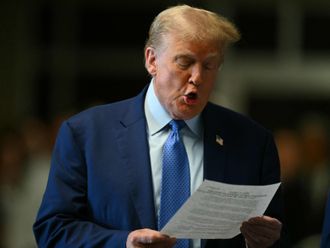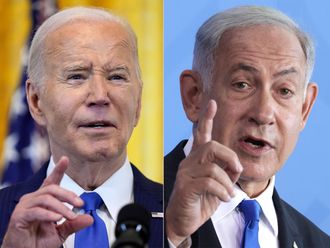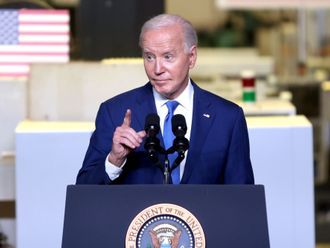Washington: Less than two weeks before much of the government runs out of money, President Donald Trump on Tuesday escalated the threat of a shutdown, accusing Democratic congressional leaders of plotting to use their leverage to raise taxes and flood the country with unauthorised immigrants.
The Democratic leaders, Senator Chuck Schumer of New York and Representative Nancy Pelosi of California, responded to the president’s provocations by pulling out of a scheduled White House meeting that was supposed to address the thorny issues that lawmakers are facing as the end of the year approaches.
Trump then doubled down, posing for television cameras at the White House next to empty chairs and calling his would-be negotiating partners weak on crime, weak on immigration and weak on the military.
“They’ve been all talk, and they’ve been no action, and now it’s even worse,” Trump said. “Now it’s not even talk.”
The spectacle was an unpromising start to the difficult negotiations ahead, with a deadline of December 8, when government funding runs out. Democrats hold significant leverage because Republicans do not have enough votes to pass a spending measure next week without some Democratic support. Pelosi and Schumer hope to use the year-end negotiations to help unauthorised immigrants brought to the country as children and to provide financing for the Children’s Health Insurance Programme, whose funding lapsed at the end of September.
And on Capitol Hill, some progress was made on Tuesday during talks on the Republican tax bill. Trump voiced support for legislation to fund subsidies to health insurers that he had cut off, as well as another bipartisan health care measure that could lower insurance premiums under the Affordable Care Act.
Theatrics, war of words
But the war of words in public did little to secure the Democratic support that Trump and Republican leaders will ultimately need. The president seemed to see little risk in a holiday government shutdown.
“If that happens, I would absolutely blame the Democrats,” he said. “If it happens, it’s going to be over illegals pouring into the country, crime pouring into the country, no border wall — which everybody wants.”
Pelosi fired back on Twitter, mocking the Republican leaders, Senator Mitch McConnell of Kentucky and House Speaker Paul Ryan of Wisconsin, for going along with the theatrics and declaring that the president “now knows that his verbal abuse will no longer be tolerated.”
“His empty chair photo opp showed he’s more interested in stunts than in addressing the needs of the American people,” she continued. “Poor Ryan and McConnell relegated to props. Sad!”
The prospect of a government shutdown is another serious issue for lawmakers to grapple with alongside the tax effort. Adding to the uncertainty, Trump mused on Twitter this year that “our country needs a good ‘shutdown,’” suggesting he may possess an unconventional view of the wisdom of letting government funding lapse.
Exasperated aides to the president assured congressional advisers that the president had simply been trying to stoke drama, and that he did not intend to suggest that no deal could be reached. But the president has toggled back and forth between sounding open to the Democrats’ demands on immigration and insisting on an immigration hard line and the need for a border wall.
Tweet starts it, as usual
The acrimonious back-and-forth between Trump and the Democratic leaders began, as has become customary, with a presidential tweet. Hours before he was set to meet with the top congressional leaders from both parties, he offered a downbeat forecast for negotiating with Schumer and Pelosi.
“Problem is they want illegal immigrants flooding into our Country unchecked, are weak on Crime and want to substantially RAISE Taxes,” he wrote. “I don’t see a deal!”
Two hours later, Schumer and Pelosi struck back.
“Given that the president doesn’t see a deal between Democrats and the White House, we believe the best path forward is to continue negotiating with our Republican counterparts in Congress instead,” they said in a statement announcing that they would skip the meeting.
The White House press secretary, Sarah Huckabee Sanders, said the president wanted Democrats to “put aside their pettiness, stop the political grandstanding, show up and get to work.”
All the more remarkable was the change in tone from just a few months ago. Trump struck a fiscal deal with Schumer and Pelosi in September, taking Republicans by surprise. But on Tuesday, the alliance with “Chuck and Nancy” was no more.
The list of issues is longer than immigration, the border wall and health care. Lawmakers would like to pass a spending measure to fund the government through the rest of the 2018 fiscal year, which goes through September 30. But to do so, party leaders need to come to a deal to lift strict caps on spending that were imposed in 2011.
Defence spending
Defence hawks like Senator John McCain, Republican from Arizona, want a big boost in military spending. Democrats insist that non-defence spending should increase by just as much.
With time running short, lawmakers may be forced to pass a stop-gap spending measure to keep the government open past next week, just as they did in September when the last shutdown deadline approached, but that too would need Democratic votes.
With few other levers of power, Democrats are under pressure from their core voters to extract as many concessions as they can. They are determined to secure legislation to protect the young unauthorised immigrants known as ‘Dreamers’, based on never-passed proposals in Congress called the DREAM Act, who were put at risk by Trump’s decision to end an Obama-era programme that shields them from deportation. And Democrats want to reach a deal regarding that programme, called Deferred Action for Childhood Arrivals, or DACA, as part of the year-end negotiations.
“What we do now is return to our Republican colleagues and say, ‘Is this the direction you want to take our government at the end of the year?’” said Representative Joseph Crowley of New York, a member of the Democratic leadership. “Not only put at jeopardy thousands of individuals who are on DACA, but the entire government workforce right before the Christmas and Hanukkah holiday, before the New Year?”
Another issue is the Children’s Health Insurance Programme, which has had broad bipartisan support since it was created in 1997. Funds expired at the end of September, and Republicans and Democrats have fought over how to pay for an extension. Unless Congress provides more money, states will have to freeze enrolment or start shutting down the programme, which serves more than 8 million children.












